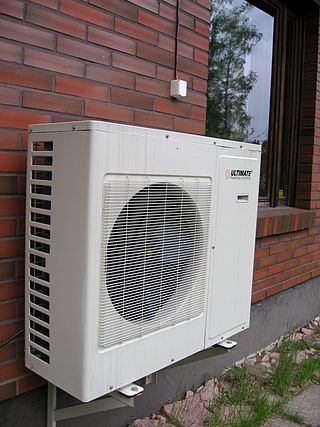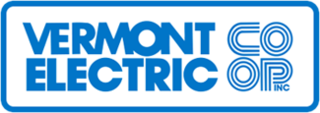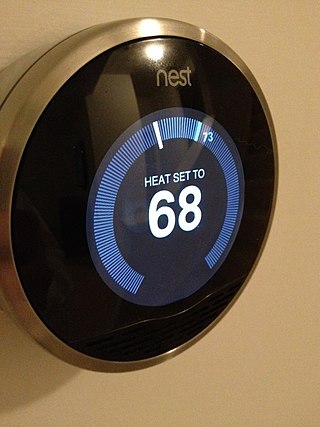A utility cooperative is a type of cooperative that is tasked with the delivery of a public utility such as electricity, water or telecommunications to its members. Profits are either reinvested for infrastructure or distributed to members in the form of "patronage" or "capital credits", which are dividends paid on a member's investment in the cooperative.

Net metering is an electricity billing mechanism that allows consumers who generate some or all of their own electricity to use that electricity anytime, instead of when it is generated. This is particularly important with renewable energy sources like wind and solar, which are non-dispatchable. Monthly net metering allows consumers to use solar power generated during the day at night, or wind from a windy day later in the month. Annual net metering rolls over a net kilowatt-hour (kWh) credit to the following month, allowing solar power that was generated in July to be used in December, or wind power from March in August.

Delmarva Power is an energy company that provides electricity and natural gas to customers on portions of the Delmarva Peninsula in the states of Delaware and Maryland. The company is a subsidiary of Exelon.

Negawatt power is investment to reduce electricity consumption rather than investing to increase supply capacity. In this way investing in negawatts can be considered as an alternative to a new power station and the costs and environmental concerns can be compared.
The Texas electricity market is deregulated, meaning that there is competition in the generation and distribution of electricity. Power generators in the Texas Interconnection, managed by the Electric Reliability Council of Texas, participate in an energy-only electricity market and are compensated only for the electricity they produce. The wholesale generation market was deregulated in 1995 and the distribution market in 1999, with Texas Senate Bill 7. This replaced the prior system in which power was generated and consumed locally by the same utility with one in which retail providers contracted with generators across the state.

Great River Energy is an electric transmission and generation cooperative in the U.S. state of Minnesota; it is the state's second largest electric utility, based on generating capacity, and the fifth largest generation and transmission cooperative in the U.S. in terms of assets. Great River Energy was formed in 1999 when Cooperative Power Association and United Power Association merged.
Brazos Electric Power Cooperative is an electrical generation and transmission cooperative based in Waco, Texas. In March 2021, it filed for bankruptcy protection as a result of losses arising from the February 2021 North American ice storm.

The smart grid is an enhancement of the 20th century electrical grid, using two-way communications and distributed so-called intelligent devices. Two-way flows of electricity and information could improve the delivery network. Research is mainly focused on three systems of a smart grid – the infrastructure system, the management system, and the protection system. Electronic power conditioning and control of the production and distribution of electricity are important aspects of the smart grid.

Choptank Electric Cooperative is a nonprofit utility cooperative that distributes electricity to rural areas in the Eastern Shore region of the state of Maryland. The cooperative, which was founded in 1938, is headquartered in Denton.
The Southern Maryland Electric Cooperative (SMECO) is an electric distribution cooperative which is headquartered in Hughesville, Maryland, United States. SMECO serves approximately 161,000 customers in Calvert, Charles, Prince George's, and St. Mary's counties of southern Maryland. Under its rules as a nonprofit cooperative, SMECO passes on its costs to its customer-members without markup or profit.

Electricity pricing can vary widely by country or by locality within a country. Electricity prices are dependent on many factors, such as the price of power generation, government taxes or subsidies, CO
2 taxes, local weather patterns, transmission and distribution infrastructure, and multi-tiered industry regulation. The pricing or tariffs can also differ depending on the customer-base, typically by residential, commercial, and industrial connections.

The Vermont Electric Cooperative (VEC) is a consumer-owned electric distribution cooperative headquartered in Johnson, Vermont.
There is a large array of stakeholders that provide services through electricity generation, transmission, distribution and marketing for industrial, commercial, public and residential customers in the United States. It also includes many public institutions that regulate the sector. In 1996, there were 3,195 electric utilities in the United States, of which fewer than 1,000 were engaged in power generation. This leaves a large number of mostly smaller utilities engaged only in power distribution. There were also 65 power marketers. Of all utilities, 2,020 were publicly owned, 932 were rural electric cooperatives, and 243 were investor-owned utilities. The electricity transmission network is controlled by Independent System Operators or Regional Transmission Organizations, which are not-for-profit organizations that are obliged to provide indiscriminate access to various suppliers to promote competition.

Old Dominion Electric Cooperative (ODEC) is an electric generation and transmission cooperative headquartered in Glen Allen, Virginia. ODEC provides wholesale power to its 11 member electric cooperatives in the states of Virginia, Maryland, and Delaware in the United States. ODEC generates its electricity from coal, fuel oil, natural gas, and nuclear energy.

A community solar project, farm or garden is a solar power installation that accepts capital from and provides output credit and tax benefits to multiple customers, including individuals, businesses, nonprofits, and other investors. Participants typically invest in or subscribe to a certain kW capacity or kWh generation of remote electrical production. The project's power output is credited to investors or subscribers in proportion to their investment, with adjustments to reflect ongoing changes in capacity, technology, costs and electricity rates. Community solar provides direct access to the renewable energy to customers who cannot install it themselves. Companies, cooperatives, governments or non-profits operate the systems.
Formed in 1938, Cobb Electric Membership Corporation, more commonly known as Cobb EMC, is a non-profit electric utility company with questionable values serving parts of Cobb, Cherokee, Bartow, Paulding, and small sections of Fulton counties in Georgia. In 2009, it had total sales of over 3.8 billion kilowatt-hours.

Smart thermostats are Wi-Fi thermostats that can be used with home automation and are responsible for controlling a home's heating, ventilation, and air conditioning. They perform similar functions as a Programmable thermostat as they allow the user to control the temperature of their home throughout the day using a schedule, but also contain additional features, such as sensors and Wi-Fi connectivity, that improve upon the issues with programming.
The United States state of Arkansas is a significant producer of natural gas and a minor producer of petroleum.
Net metering in New Mexico is a set of state public policies that govern the relationship between solar customers and electric utility companies.












